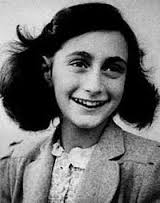By Joel H. Cohen


(Photo: Wikipedia)
NEW YORK — Last Wednesday (June 12) marked the 90th birthday of a world-famous woman, but there were no gifts, cards or cake and certainly no party. For, though this international icon — Anne Frank — left an indelible legacy, she’d died in her teens.
In Amsterdam years ago, we visited the Anne Frank House. There, through the revolving bookcases that too briefly had been a lifesaving barricade, I was, surprisingly, moved emotionally seeing photos of movie stars Anne had pasted under glass, the sort of ordinary thing teens everywhere might do. (I had baseball players on my bedroom wall.)
And then came the staggering fact that un-dammed my tears: she and I were born just 18 days apart! And with it, the shocking realization: Our fates could easily have been reversed.
Better yet, we might have both grown up in the USA and been neighbors, classmates, friends. But that was not to be.
For Anne’s 13th birthday, June 12, 1942, she was given a diary as a gift. One early entry:
“After May 1940, good times rapidly fled; first the war, then the capitulation, followed by the arrival of the Germans, which is when the suffering of us Jews really began.”
Jews had to wear an identifying star, surrender their bicycles, were banned from trains, non-Jewish stores, cinemas, visiting Christian friends, and even sitting in their gardens after curfew.
“But life went on, in spite of it all,” she wrote.
On my 13th birthday, by contrast, I celebrated my Bar Mitzvah, received gifts of U.S. bonds and cash, some of which I used to treat my dad and an uncle to the baseball All-Star game at New York’s Polo Grounds. A concession to WW II: the game started early so lights would not illuminate potential targets for enemy aircraft.
Year later, trying to absorb the Holocaust’s magnitude, I’d sit in a crowded baseball stadium and imagine the thousands of us being rounded up and marched to a concentration camp…then calculate how many stadium-capacity spectators would total six million.
Anne wrote then: “I can’t tell you how oppressive it is never to be able to go outdoors, I am afraid we shall be discovered and be shot…not exactly a pleasant prospect.”
On Staten Island, NY, meanwhile, we bade sad, proud goodbyes to neighbors off to war, several who would die in action. At home Sunday nights, we stayed bonded to the radio, hoping Gabriel Heatter would have “good news tonight.”
Our fathers, too old for active military duty, served as Air Raid Wardens, and we kids reminded them of weekly meetings. Among them was a pleasant-seeming German neighbor.
While Anne daydreamed about Hollywood and freedom, we went to the movies and saw her stars perform. One day, Movietone News reported the FBI had arrested two Nazi spies, one our neighbor.
When the Frank family went into hiding, sentenced to silence, Anne noted: “Jews in hiding who were found out or betrayed were sent to a concentration camp immediately, and the penalty for helping people was death.”
On June 6, 1944, the hope D-Day generated is reflected in Anne’s diary entry: ” Would the long-awaited liberation that has been talked of so much, but which still seems too wonderful, too much like a fairy tale, ever come true? ”
It didn’t for Anne. Two months later, on Aug. 4, 1944, a truck pulled up outside the house and police headed directly for the bookcase. Aroused and horrified by the banging and shouts of “Open up,” the Frank family and their relatives and friends were powerless to resist. (Among papers thrown carelessly on the ground was Anne’s diary.)
They were sent to a Holland camp where thousands of Jews were held prior to transport to forced labor or extermination camps. Anne and the others were loaded on cattle cars for a three-day journey to Auschwitz, the Nazi death camp. Anne and her sister Margot were sent to Bergen-Belsen, where they died of typhus in March
At the time of her death, Anne was 15. So she never had a Sweet Sixteen party . . . or a prom, or…
Still trying to grasp the enormity of the Holocaust, I mourn all the victims, but mostly my contemporary Anne Frank.
I don’t think it‘s “guilt of survivorship” that makes my relationship with someone I’ve never met so strong. Is it because Anne was in many ways like the rest of us, or our children, and thus easy to identify with and mourn? Is it because we’ve come to know her as a person, not a number/?
It would be the ultimate in chutzpah to attribute to Divine choice the fortune and misfortune in our destinies–that I was saved and she doomed. No, I thank and blame geography. (I’ve never had the courage to wish our fates had been reversed, but rather that we both lived here.)
Among Anne’s survivors is this mourner whose birthday came 18 days before Anne would have celebrated hers. So many imponderables still won’t go away. Perhaps foremost: Why would ‘they’ want to hurt a kid like that? Why anyone, but especially a kid so unique and yet so much like the rest of us?
*
Cohen is a freelance writer based in New York.